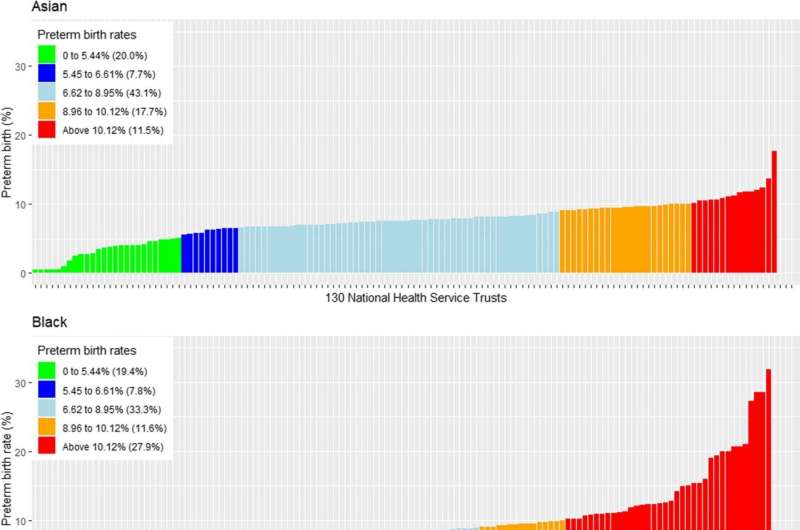
Preterm birth rates are lower than the national average for white women and higher for Black and Asian women, and women living in the most deprived areas, according to a new University of Bristol-led study published in BMC Medicine.
The study analyzed data from 1.3 million births across the 130 NHS Trusts in England and is the first to report ethnic and socioeconomic disparities in preterm birth rates.
In the UK, about 1 in every 13 births is a preterm birth, and more than 50,000 cases occur annually. Despite the existence of preventive measures for women deemed to be at high risk, a persistent increase in preterm birth rates continues.
Until now, there has been a lack of evidence regarding how socioeconomic disparities affect preterm birth rates. To investigate this, the team at Tommy’s National Center for Maternity Improvement used data from the National Maternity and Perinatal Audit data, for babies born in England between 2015 and 2017.
The study found that of the 1,174,047 births and 91,056 preterm births recorded between 2015 to 2017, the preterm birth rate ranged from 6.8/100 births for women living in the least deprived areas to 8.8/100 births for those living in the most deprived areas. Similarly, the preterm birth rate ranged from 7.8/100 births for white women, up to 8.6/100 births for Black women.
The findings also show the risk of preterm birth varied between and within NHS Trusts. Within the same Health Trust, preterm birth rate appears to be variable depending on the women’s ethnicity, with preterm birth rates lower than the national average in white women while being higher than the national average in Black and Asian women.
Dr. Erik Lenguerrand, senior lecturer in medical statistics and quantitative epidemiologist in the Bristol Medical School, Translational Health Sciences (THS) at the University of Bristol, and the study’s senior author, said, “The reasons for these disparities are not fully understood. Socioeconomic and/or ethnic inequalities are likely to be responsible for some of these inequalities in preterm birth in England, but the Health Trust of birth plays a leading role in the inequity of health care being delivered.
“Disparities in preterm birth could be reduced by targeting populations that have higher than average rates of preterm birth as early as possible in the antenatal care pathway.
“A strategy to reduce the number of preterm births by 25% every year could result in 3,633 fewer preterm births in Black and Asian women, and 6,472 fewer preterm births in women living in the most deprived areas. Although reducing preterm birth numbers by 25% will improve outcomes for all women, it will not narrow differences between different ethnic and socioeconomic groups.”
Kath Abrahams, chief executive of Tommy’s, said, “Premature birth can have life-changing consequences, leaving children at higher risk of long-term complications including learning disabilities, hearing problems and visual impairment.
“As this study shows very starkly, people from minoritized ethnic groups in the UK and those living in the most deprived areas are more likely to experience premature birth, contributing to a damaging cycle of health inequalities.
“We are determined to reduce those disparities through our research into the causes of preterm birth, and by translating our findings into treatments that will stop babies being born too soon.”
The study team recommends the analysis is repeated when more recent data is available from the Maternity Services Dataset, so that any changes across NHS Trusts can be examined further.
More information:
G. Kayode et al, Socioeconomic and ethnic disparities in preterm births in an English maternity setting: a population-based study of 1.3 million births, BMC Medicine (2024). DOI: 10.1186/s12916-024-03493-x
Citation:
Study finds health disparities in preterm births in England (2024, September 23)
retrieved 23 September 2024
from https://medicalxpress.com/news/2024-09-health-disparities-preterm-births-england.html
This document is subject to copyright. Apart from any fair dealing for the purpose of private study or research, no
part may be reproduced without the written permission. The content is provided for information purposes only.


